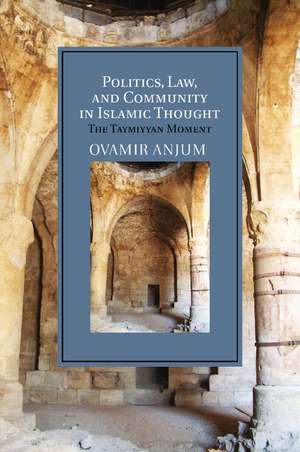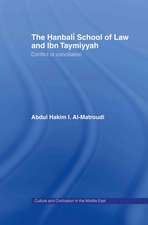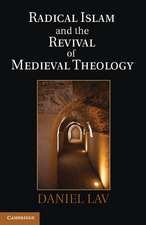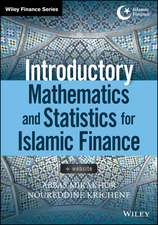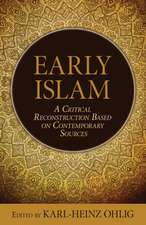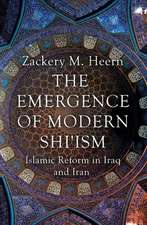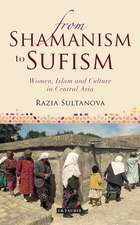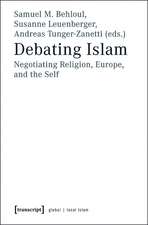Politics, Law, and Community in Islamic Thought: The Taymiyyan Moment: Cambridge Studies in Islamic Civilization
Autor Ovamir Anjumen Limba Engleză Paperback – 19 mar 2014
| Toate formatele și edițiile | Preț | Express |
|---|---|---|
| Paperback (1) | 185.26 lei 3-5 săpt. | +16.21 lei 7-13 zile |
| Cambridge University Press – 19 mar 2014 | 185.26 lei 3-5 săpt. | +16.21 lei 7-13 zile |
| Hardback (1) | 695.06 lei 6-8 săpt. | |
| Cambridge University Press – 18 mar 2012 | 695.06 lei 6-8 săpt. |
Din seria Cambridge Studies in Islamic Civilization
-
 Preț: 199.99 lei
Preț: 199.99 lei - 14%
 Preț: 768.30 lei
Preț: 768.30 lei - 11%
 Preț: 695.06 lei
Preț: 695.06 lei -
 Preț: 233.11 lei
Preț: 233.11 lei - 19%
 Preț: 566.82 lei
Preț: 566.82 lei -
 Preț: 230.14 lei
Preț: 230.14 lei -
 Preț: 289.39 lei
Preț: 289.39 lei - 9%
 Preț: 591.82 lei
Preț: 591.82 lei -
 Preț: 281.30 lei
Preț: 281.30 lei - 14%
 Preț: 675.82 lei
Preț: 675.82 lei -
 Preț: 243.53 lei
Preț: 243.53 lei - 14%
 Preț: 680.53 lei
Preț: 680.53 lei -
 Preț: 295.58 lei
Preț: 295.58 lei -
 Preț: 328.80 lei
Preț: 328.80 lei -
 Preț: 417.25 lei
Preț: 417.25 lei - 11%
 Preț: 693.02 lei
Preț: 693.02 lei -
 Preț: 408.37 lei
Preț: 408.37 lei -
 Preț: 284.17 lei
Preț: 284.17 lei - 14%
 Preț: 770.83 lei
Preț: 770.83 lei -
 Preț: 335.34 lei
Preț: 335.34 lei -
 Preț: 326.94 lei
Preț: 326.94 lei -
 Preț: 286.51 lei
Preț: 286.51 lei - 14%
 Preț: 677.47 lei
Preț: 677.47 lei -
 Preț: 208.30 lei
Preț: 208.30 lei - 11%
 Preț: 641.31 lei
Preț: 641.31 lei - 11%
 Preț: 604.41 lei
Preț: 604.41 lei - 11%
 Preț: 690.27 lei
Preț: 690.27 lei -
 Preț: 371.83 lei
Preț: 371.83 lei -
 Preț: 324.53 lei
Preț: 324.53 lei - 11%
 Preț: 698.50 lei
Preț: 698.50 lei -
 Preț: 375.30 lei
Preț: 375.30 lei - 11%
 Preț: 693.36 lei
Preț: 693.36 lei -
 Preț: 207.74 lei
Preț: 207.74 lei -
 Preț: 362.17 lei
Preț: 362.17 lei - 11%
 Preț: 694.38 lei
Preț: 694.38 lei - 11%
 Preț: 690.46 lei
Preț: 690.46 lei - 11%
 Preț: 691.66 lei
Preț: 691.66 lei - 11%
 Preț: 694.23 lei
Preț: 694.23 lei -
 Preț: 389.50 lei
Preț: 389.50 lei -
 Preț: 370.46 lei
Preț: 370.46 lei -
 Preț: 422.96 lei
Preț: 422.96 lei
Preț: 185.26 lei
Nou
Puncte Express: 278
Preț estimativ în valută:
35.45€ • 37.01$ • 29.34£
35.45€ • 37.01$ • 29.34£
Carte disponibilă
Livrare economică 15-29 martie
Livrare express 01-07 martie pentru 26.20 lei
Preluare comenzi: 021 569.72.76
Specificații
ISBN-13: 9781107687110
ISBN-10: 110768711X
Pagini: 316
Dimensiuni: 152 x 229 x 17 mm
Greutate: 0.42 kg
Editura: Cambridge University Press
Colecția Cambridge University Press
Seria Cambridge Studies in Islamic Civilization
Locul publicării:New York, United States
ISBN-10: 110768711X
Pagini: 316
Dimensiuni: 152 x 229 x 17 mm
Greutate: 0.42 kg
Editura: Cambridge University Press
Colecția Cambridge University Press
Seria Cambridge Studies in Islamic Civilization
Locul publicării:New York, United States
Cuprins
Introduction; Part I. The Classical Legacy: 1. A tale of two visions: Shari'a and Siyasa in early Islam; 2. The political thought of the classical period; 3. Reason and community in the classical period; Part II. The Taymiyyan Intervention: 4. Ibn Taymiyya's world; 5. Defending revelation and liberating reason; 6. Fitra, community, and Islamic politics; 7. Conclusion.
Recenzii
"Like all others, Islam’s is a storied tradition. And the manner in which one generation receives or understands its storied legacy can engender mutations that seemingly determine the substance and range of possibilities handed down to posterity. At a time when scholars of Islamic law are inviting us to close the book on Islam’s preparedness to meet contemporary political challenges, Ovamir Anjum brilliantly points the way to an alternative reading of the intellectual history that allegedly produced this outcome. And in the course of doing so, his attention to the nexus between law, theology and political thinking point up the inadequacy of approaches that overly isolate them. Against the tendency both to restrict Islam to accepted medieval readings and to separate it from its own storied metacognitions, Anjum reminds us that Islam has never known an authority powerful enough to curtail its perennial attempt to understand and realize its highest calling." -Sherman A. Jackson, King Faisal Chair of Islamic Thought and Culture, University of Southern California, author of Islamic Law and the State: The Constitutional Jurisprudence of Shihâb al-Dîn al-Qarâfî
"With bold and penetrating insight, Ovamir Anjum completely reframes our understanding of the great Damascene jurist Ibn Taymiyya’s views on politics and the caliphate. After thoroughly documenting the pessimism permeating classical Islamic theology and political theory, Anjum expounds Ibn Taymiyya’s contrasting epistemological optimism and shows how this grounds a robust vision of the Shari‘a that extends far beyond the traditional domains of the legal scholars and the caliphate to include all the functions of government and the Muslim community as a whole. This remarkably wide-ranging study will spur deeper reflection on the function of political theory in medieval Islam, and it sets the stage for an entirely new evaluation of how modern Muslim political theorists have appropriated Taymiyyan thought." -Jon Hoover, Lecturer in Islamic Studies, The University of Nottingham, author of Ibn Taymiyya’s Theodicy of Perpetual Optimism
"Finally: a study capturing the complex intersections of jurisprudence and government in Islam before the early modern centuries. Anjum’s Politics, Law and Community combines originality from departure to conclusion with rootedness in primary sources and mastery of theoretical research tools. An introduction to Islamic political philosophy surpassing available introductions, this work takes none of the assumptions of earlier scholarship for granted. It ushers in a new era in the field, where new studies will be produced with higher expectations in mind." -Ahmad Atif Ahmad, Associate Professor of Religious Studies, the University of California in Santa Barbara, and author of Islam, Modernity, Violence, and Everyday Life and The Fatigue of the Shari'a
"This book is a much-needed, intellectually rigorous and very timely revision of the standard literature on Islamic scholars and power. It demonstrates that alongside the familiar legalistic and elitist approach of the medieval tradition, there was also a pragmatic strand of Sunni Islamic thought that envisioned the community of the believers as the ultimate source of political authority. In the aftermath of the Arab Spring, this new interpretation of medieval Islamic political thought opens up new ways of imagining the future of Islam in public life." -Yossef Rapoport, Senior Lecturer in History, Queen Mary University of London, and author of Marriage, Money and Divorce in Medieval Islamic Society
"Boldly renegotiating our understanding of the complex intersections of government, law, and religious sentiment in the pre-modern Muslim world, Ovamir Anjum has produced a remarkable study which shifts attention away from facile dichotomies by resituating the very terms of how best to engage with the legacy of Ibn Taymiyya, a difficult yet critical figure in Islamic legal and intellectual history. In doing so, the implications of this study reach far beyond its overt ambit to embrace wider questions pertaining to how best to understand the ongoing history of such discourse amongst Muslim thinkers from the medieval period to the present. An important book." -Erik S. Ohlander, Associate Professor of Religious Studies, Indiana University-Purdue University Fort Wayne
"A real tour-de-force that brings to life the Islamic discursive tradition on politics through an impressive analysis of theological, literary, jurisprudential and epistemological texts of the classical period. Using sophisticated theoretical analyses and by paying close attention to the content and contexts of classical works, Ovamir Anjum offers new insights into the intertextual negotiations that led to the religious scholars’ compromises with political authority. His analysis of Ibn Taymiyya’s works in light of this tradition not only helps us revise our understanding of the master critic’s project, but it also helps us situates the novelty of his vision and proposals within the context of Mamluk society and politics. His work thus challenges traditional portrayals of this period as one of “decline”, and furthers our appreciation of the intellectual vibrancy of this politically chaotic period." -Nahyan Fancy, Assistant Professor, DePauw University, author of Science and Religion in Mamluk Egypt (forthcoming)
"Politics, Law, and Community in Islamic Thought is a valuable contribution to the history of Islamic political experience. It approaches this rich history as a tradition of conflicting interpretations and debates that culminates in a fascinating re-examination of Ibn Taymiyya’s creative response to the politics and thought of his turbulent time. In this account Ibn Taymiyya emerges as an original political thinker who restored (and elaborated on) the central role of the community in theories of Islamic governance. This book deserves to be widely read not only by specialists in medieval Islamic history but also by all who are interested in contemporary Islamic thought." -Talal Asad, Professor of Anthropology, CUNY Graduate Center
"With bold and penetrating insight, Ovamir Anjum completely reframes our understanding of the great Damascene jurist Ibn Taymiyya’s views on politics and the caliphate. After thoroughly documenting the pessimism permeating classical Islamic theology and political theory, Anjum expounds Ibn Taymiyya’s contrasting epistemological optimism and shows how this grounds a robust vision of the Shari‘a that extends far beyond the traditional domains of the legal scholars and the caliphate to include all the functions of government and the Muslim community as a whole. This remarkably wide-ranging study will spur deeper reflection on the function of political theory in medieval Islam, and it sets the stage for an entirely new evaluation of how modern Muslim political theorists have appropriated Taymiyyan thought." -Jon Hoover, Lecturer in Islamic Studies, The University of Nottingham, author of Ibn Taymiyya’s Theodicy of Perpetual Optimism
"Finally: a study capturing the complex intersections of jurisprudence and government in Islam before the early modern centuries. Anjum’s Politics, Law and Community combines originality from departure to conclusion with rootedness in primary sources and mastery of theoretical research tools. An introduction to Islamic political philosophy surpassing available introductions, this work takes none of the assumptions of earlier scholarship for granted. It ushers in a new era in the field, where new studies will be produced with higher expectations in mind." -Ahmad Atif Ahmad, Associate Professor of Religious Studies, the University of California in Santa Barbara, and author of Islam, Modernity, Violence, and Everyday Life and The Fatigue of the Shari'a
"This book is a much-needed, intellectually rigorous and very timely revision of the standard literature on Islamic scholars and power. It demonstrates that alongside the familiar legalistic and elitist approach of the medieval tradition, there was also a pragmatic strand of Sunni Islamic thought that envisioned the community of the believers as the ultimate source of political authority. In the aftermath of the Arab Spring, this new interpretation of medieval Islamic political thought opens up new ways of imagining the future of Islam in public life." -Yossef Rapoport, Senior Lecturer in History, Queen Mary University of London, and author of Marriage, Money and Divorce in Medieval Islamic Society
"Boldly renegotiating our understanding of the complex intersections of government, law, and religious sentiment in the pre-modern Muslim world, Ovamir Anjum has produced a remarkable study which shifts attention away from facile dichotomies by resituating the very terms of how best to engage with the legacy of Ibn Taymiyya, a difficult yet critical figure in Islamic legal and intellectual history. In doing so, the implications of this study reach far beyond its overt ambit to embrace wider questions pertaining to how best to understand the ongoing history of such discourse amongst Muslim thinkers from the medieval period to the present. An important book." -Erik S. Ohlander, Associate Professor of Religious Studies, Indiana University-Purdue University Fort Wayne
"A real tour-de-force that brings to life the Islamic discursive tradition on politics through an impressive analysis of theological, literary, jurisprudential and epistemological texts of the classical period. Using sophisticated theoretical analyses and by paying close attention to the content and contexts of classical works, Ovamir Anjum offers new insights into the intertextual negotiations that led to the religious scholars’ compromises with political authority. His analysis of Ibn Taymiyya’s works in light of this tradition not only helps us revise our understanding of the master critic’s project, but it also helps us situates the novelty of his vision and proposals within the context of Mamluk society and politics. His work thus challenges traditional portrayals of this period as one of “decline”, and furthers our appreciation of the intellectual vibrancy of this politically chaotic period." -Nahyan Fancy, Assistant Professor, DePauw University, author of Science and Religion in Mamluk Egypt (forthcoming)
"Politics, Law, and Community in Islamic Thought is a valuable contribution to the history of Islamic political experience. It approaches this rich history as a tradition of conflicting interpretations and debates that culminates in a fascinating re-examination of Ibn Taymiyya’s creative response to the politics and thought of his turbulent time. In this account Ibn Taymiyya emerges as an original political thinker who restored (and elaborated on) the central role of the community in theories of Islamic governance. This book deserves to be widely read not only by specialists in medieval Islamic history but also by all who are interested in contemporary Islamic thought." -Talal Asad, Professor of Anthropology, CUNY Graduate Center
Notă biografică
Descriere
This study reassesses the influence and philosophy of Ibn Taymiyya, one of the greatest medieval Islamic theologians.
